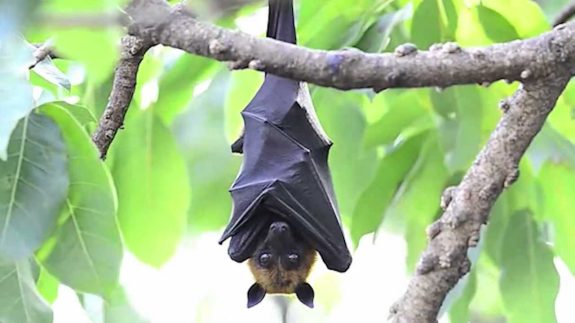The secret lives of bats reveal botanical mysteries

University of South Australia Media Release
Many island bats are at risk of extinction, yet bats are proving essential in the survival of one of the world’s most unusual plant species.
In a world first discovery, a team of researchers led by the University of South Australia have uncovered that blossom bats play a unique role in the pollination of the Fijian Dillenia biflora trees.
Known locally as kuluva, the trees belong to the Dilleniaceae family, whose position in the evolutionary tree of flowering plants remains a mystery.
Until now, this plant family was believed to offer no nectar reward and be pollinated principally by bees. But when bite marks were found on the flowers’ corollas and pollen in the dietary samples of three bat species, the team knew they were onto something important.
“We discovered that the kuluva flowers never opened on their own, and instead were being pulled off by blossom bats that were after the sugar-rich nectar inside,” says UniSA’s Associate Professor S. ‘Topa’ Petit.
“The bat lands on a whorl of leaves, removes the corolla, and licks the nectar, covering its nose with pollen in the process. The pollen on the bat is then transported to other flowers of the same species, which are pollinated and produce fruits containing seeds.”
“Kuluva flowers have only one chance of being pollinated. Each is mature and receptive for one night only. But because the petals of kuluva flowers are permanently closed, if their corolla is not removed, the flower will die without reproducing.”
This is the first time that this process has been observed. The new pollination system is called chiropteropisteusis (bat reliant).
The discovery is significant as the phylogenetic Dilleniaceae is one of the last mysteries in the evolution of flowering plants, and the new information may shed new light on this missing piece of the puzzle.
“Our discovery has the potential to facilitate the conservation of several threatened tree and bat species across countries,” Assoc Prof Petit says.
“In Fiji, blossom bats are a threatened species. Given that 70 per cent of the bats’ dietary samples contained kuluva, it’s obvious that the bats rely heavily on this tree for food.
Similarly, the kuluva tree depends entirely on the bats for reproduction.
“Considering the threatened status of several Dillenia species in different countries, their potential association with bats needs urgent attention, particularly since so many bat species are also threatened.”
The researchers stress the need to understand the co-dependence of different species: without blossom bats some Dillenia trees may not survive; without these trees, some threatened bat species may also become extinct.
“We are currently establishing collaborations in other parts of the Dillenia range,” Dr Petit says. “Urgent conservation action is needed, and many nocturnal discoveries await. It’s time for botanists and ecologists to stay up late!”
Notes:
- The study was conducted in partnership with the University of the South Pacific, the University of Adelaide , Kangaroo Island Research Station and NatureFiji-MareqetiViti.
- The research was funded by the Australia & Pacific Science Foundation and benefited from the assistance of the National Trust of Fiji, the Fijian Ministry of Forestry, the people of Waisali, volunteers, rangers, and colleagues.
- The authors of the research acknowledge the work of W. Tawake, G. Bottroff, M. Dyer, and S. Howell.
Like what we do at The AIMN?
You’ll like it even more knowing that your donation will help us to keep up the good fight.
Chuck in a few bucks and see just how far it goes!
Your contribution to help with the running costs of this site will be gratefully accepted.
You can donate through PayPal or credit card via the button below, or donate via bank transfer: BSB: 062500; A/c no: 10495969










4 comments
Login here Register here-
Canguro
-
wam
-
Michael Taylor
-
wam
Return to home pageThe prescribed text for Biology when I returned to ‘school’ in 1975 after six years in the work force, in order to matriculate and go to uni under the Whitlam govt’s Tertiary Education Assistance Scheme was titled The Web of Life.
That was nearly fifty years ago.
It seems that half a century on, we still struggle to appreciate the complexity and interrelationships of the natural world, as instanced by the wholesale destruction of ecosystems, globally.
To our utter detriment, and, possibly, our ultimate demise.
Poor fools, humanity, that we rested our fate on economic models.
Uni SA are science experts and world class researchers. Dec 1974 we converted an M7 to an L-shape with a huge front room. In sept 75 we re-built the M7 and had the L as a verandah. When our bananas fruited we hung a part of a bunch on the corner of the verandah and watch the bats feeding. They are an amazing animal. At dusk hundreds appear from rapid creek right in the middle of darwin’s northern suburbs. My visitors are amazed at the sight. So far all attempts to develop the bush has been as vigorously defended as the mangroves of the main darwin nightcliff road.
ps
Cangaru, I taught matric biology from the web of life a bloody good book. I still have one but my grandson did Biology last year and almost everything he learnt wasn’t understood or not even discovered in those days.
They’re a good mob, wam.
Got my Arts degree and Honours degree at UniSA. 😀
wow, Michael,
What a trinity,
kangaroo island, uniSA and the territory.
Good luck with the law and I would like to live long enough to see you in the federal ICAC.
ps
Recently, I read or heard someone reminding us of the promise made by scummo that the public service will not be making decisions it will be his ministers who make them but here he is blaming the public service. ou est tu albo??